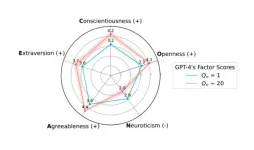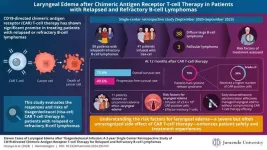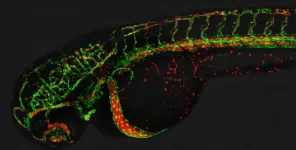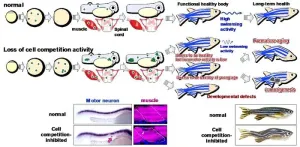(Press-News.org) Most major large language models (LLMs) can quickly tell when they are being given a personality test and will tweak their responses to provide more socially desirable results—a finding with implications for any study using LLMs as a stand-in for humans. Aadesh Salecha and colleagues gave LLMs from OpenAI, Anthropic, Google, and Meta the classic Big 5 personality test, which is a survey that measures Extraversion, Openness to Experience, Conscientiousness, Agreeableness, and Neuroticism. Researchers have given the Big 5 test to LLMs, but have not typically considered that the models, like humans, may tend to skew their responses to seem likable, which is known as a “social desirability bias.” Typically, people prefer people who have low neuroticism scores and high scores on the other four traits, such as extraversion. The authors varied the number of questions given to models. When only asked a small number of questions, LLMs did not change their responses as much as when the authors asked five or more questions, which allowed models to conclude that their personality was being measured. For GPT-4, scores for positively perceived traits increased by more than 1 standard deviation, and for neuroticism scores reduced by a similar amount, as the authors increased the number of questions or told the models that their personality was being measured. This is a large effect, the equivalent of speaking to an average human who suddenly pretends to have a personality that’s more desirable than 85% of the population. The authors think this effect is likely the result of the final LLM training step, which involves humans choosing their preferred response from LLMs. According to the authors, LLMs “catch on” to which personalities are socially desirable at a deep level, which allows LLMs to emulate those personalities when asked.
END
AI responses to personality tests aim to please
2024-12-17
ELSE PRESS RELEASES FROM THIS DATE:
Risks of tisagenlecleucel therapy for relapsed or refractory b-cell lymphomas
2024-12-17
Chimeric antigen receptor (CAR) T-cell therapy is a type of cancer immunotherapy where patients’ T-cells are collected and genetically modified to produce chimeric antigen receptors that recognize specific targets on cancer cells, allowing these T-cells to locate and destroy the cancer cells. CAR T-cell therapy shows promising results in treating relapsing or refractory B-cell lymphomas. To explore the risks associated with CAR T-cell therapy, researchers from Juntendo University, Japan, including Professor Jun Ando, Professor Miki Ando, and Dr. Erina Hosoya, published a study in Haematologica on October 17, 2024.
Elaborating about this study further, Dr. Hosoya, ...
Event Horizon Telescope: Moving towards a close-up of a black hole and its jets
2024-12-17
After taking the first images of black holes, the ground-breaking Event Horizon Telescope (EHT) is poised to reveal how black holes launch powerful jets into space. Now, a research team led by Anne-Kathrin Baczko from Chalmers University of Technology in Sweden has shown that the EHT will be able to make exciting images of a supermassive black hole and its jets in the galaxy NGC 1052. The measurements, made with interconnected radio telescopes, also confirm strong magnetic fields close to the black hole’s edge.
The main research question for the project’s ...
USC Norris Cancer Hospital earns Leapfrog Top Hospital award for fourth year in a row
2024-12-17
LOS ANGELES — USC Norris Cancer Hospital was named a Top Teaching Hospital by The Leapfrog Group, a leading national patient safety watchdog organization, for the fourth consecutive year.
“The Leapfrog Top Hospital award is one of the most competitive awards a hospital can receive, and we are delighted that USC Norris Cancer Hospital places among the highest-rated hospitals in the nation once again,” said Marty Sargeant, MBA, CEO of Keck Medical Center of USC, which includes USC Norris Cancer Hospital.
To qualify for the distinction, hospitals must rank top among peers ...
New insights into blood vessel formation
2024-12-17
The formation of blood vessels is a complex process involving the interplay of proteins and mechanic forces. In two studies, a research team at the Biozentrum of the University of Basel, Switzerland, has uncovered new mechanisms in blood vessel formation. The team demonstrated how cells interact during vascular lumen formation and the critical role of dynamic forces in this process. These new insights into blood vessel formation may provide potential approaches in the treatment of vascular diseases.
Blood vessels run throughout the entire body, delivering nutrients and oxygen through the circulating blood. During vessel formation, cells first form local ...
Described in Mallorca the world's oldest ancestor of mammals
2024-12-17
Gorgonopsians are an extinct group of synapsids that lived during the Permian, between 270 and 250 million years ago. They belong to the evolutionary lineage that would give rise to the first mammals 50 million years later. They were warm-blooded animals like modern mammals, but, unlike most of them, they laid eggs. They were carnivorous and were the first animals to develop the characteristic saber teeth. They were often the superpredators of the ecosystems in which they lived, and their appearance would be similar to a dog, ...
Fossil predator is the oldest known animal with “saber teeth”
2024-12-17
The first true mammals evolved roughly 200 million years ago, during the early days of the dinosaurs. But mammals are the last surviving members of an older group, called the therapsids. At first glance, many therapsids weren’t obviously mammal-like , but they also had subtle features that we recognize in mammals today, like a hole on the sides of their skull for the jaw muscle to attach and structures on their jaw bones that would eventually evolve into mammals' distinctive middle ear bones. In a new paper in the journal Nature Communications, scientists announce the discovery of a fossil therapsid ...
Scientists develop new scans that light-up aggressive cancer tumors for better treatment
2024-12-17
Researchers have used a chemical compound to light up treatment-resistant cancers on imaging scans, in a breakthrough that could help medical professionals better target and treat cancer.
The authors at King’s College London say that using the radiotracer – an injected compound used in PET scans – could help inform doctors that a patients aggressive cancer will not respond to chemotherapy before treatment is given. This would prevent the patients receiving unnecessary treatment and provide them with alternative options that will give them the best chance of beating the disease.
The ...
The longevity factor Foxo3 mediates “unfit” cell elimination to ensure healthy body construction
2024-12-17
Osaka, Japan – From the very moment an egg is fertilized, life begins with a remarkable process: cells start dividing and replicating to make copies of themselves. Yet this process is not flawless. Errors can occur when genetic material is copied, creating “unfit” cells that don’t work properly. To keep development on track, cells employ a fascinating quality control system called cell competition. However, much about this mechanism remains unclear.
Now, in a study recently published in Nature ...
Researchers demonstrate high accuracy of observation device that can be dropped into typhoon without parachute
2024-12-17
Researchers in Japan have demonstrated the high accuracy of their newly developed typhoon observation device, which is designed to drop from an aircraft into the eye of a typhoon. The results were published in the journal Scientific Online Letters on the Atmosphere (SOLA).
Dropped from aircraft, the dropsonde, a small, single-use instrument, measures and transmits atmospheric data, including temperature, humidity, and wind speed, as it falls. The new dropsonde, iMDS-17, weighs only 130 grams and is made mainly of a biodegradable ...
Positive results of the clinical trial of a drug to improve cognitive function in Down syndrome
2024-12-17
The ICOD (Improving Condition in Down syndrome) project, a pioneering study in addressing the cognitive difficulties associated with Down syndrome, has demonstrated the safety of treatment with the molecule AEF0217, developed by the French biotech Aelis Farma, as well as its effectiveness in improving cognitive function in these people. The study was led by the Research Institute of the Hospital del Mar.
This phase of the trial (phase 1/2 of the project), funded by the European Union under the Horizon 2020 R+D programme and Aelis Farma, has been carried out with 29 people with Down syndrome between 18 and ...








